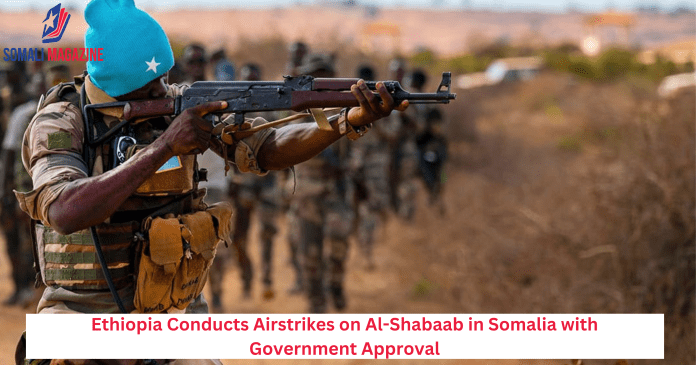Facebook Twitter Instagram Somali Magazine - People's Magazine
Coordinated Military Effort Strengthens Somalia-Ethiopia Security Ties Amid Regional Counterterrorism Operations
Mogadishu (HOL) – The Ethiopian military launched airstrikes targeting Al-Shabaab positions in Somalia’s Middle Shabelle region, Somali Defense Minister Abdukadir Mohamed Nur confirmed on Thursday.
In an interview with Somali National Television, Minister Nur emphasized that the airstrikes were carried out with the explicit approval of the Somali federal government. However, he did not disclose specific details regarding the extent of the casualties or the level of destruction caused by the strikes.
“It is impossible to conduct airstrikes inside Somalia without informing the government,” the minister stated, stressing the ongoing coordination between Mogadishu and Addis Ababa in security operations. His remarks highlighted the close military collaboration between the two neighboring nations in the fight against the Al-Shabaab insurgency.
The Somali defense minister also referenced an existing security cooperation agreement between Somalia and Ethiopia, particularly in counterterrorism efforts. He pointed to the Ankara agreement as the foundational framework guiding their military coordination. This agreement has facilitated joint operations aimed at curbing Al-Shabaab’s influence and preventing cross-border militant activities.

The latest Ethiopian airstrikes come against the backdrop of increased regional security cooperation. Last month, Ethiopia and Somalia formally solidified an arrangement allowing the Ethiopian National Defense Forces (ENDF) to operate under the African Union Support and Stabilization Mission in Somalia (AUSSOM). While Ethiopia had been actively involved in counterterrorism efforts within Somalia, Somali authorities only recently approved Ethiopia’s official participation in the AUSSOM framework.
This enhanced security collaboration follows a recent diplomatic rapprochement between the two countries after a prolonged period of tension. Relations between Mogadishu and Addis Ababa had soured for over a year due to Ethiopia’s controversial maritime access deal with Somaliland, which was viewed by Somalia as an infringement on its sovereignty. The maritime agreement had led to diplomatic strains, but recent engagements suggest a renewed commitment to restoring bilateral ties.
Somalia has long battled the Al-Shabaab militant group, which continues to pose a serious threat to national stability. The insurgents have carried out numerous attacks targeting government forces, international peacekeepers, and civilian populations. To combat this ongoing security challenge, the Somali government has increasingly sought regional cooperation, leveraging partnerships with neighboring countries like Ethiopia to bolster its counterterrorism efforts.
Ethiopia has historically played a significant role in Somalia’s security landscape. Its military forces have been involved in various peacekeeping and counterterrorism missions, either independently or under multinational initiatives. As part of the broader African Union-led efforts to stabilize Somalia, Ethiopian forces have been instrumental in supporting Somali National Army (SNA) operations against Al-Shabaab strongholds.
While the latest airstrikes underscore Ethiopia’s continued military engagement in Somalia, questions remain regarding the impact of such operations. Airstrikes, while effective in neutralizing militant threats, often raise concerns about potential civilian casualties and collateral damage. The Somali government’s approval of these operations indicates trust in Ethiopia’s military precision and adherence to coordinated strategies.
The strengthening of security ties between Somalia and Ethiopia reflects a broader regional push to address terrorism and instability. With Al-Shabaab continuing to wage insurgency campaigns, cooperative measures such as intelligence-sharing, joint military operations, and strategic airstrikes are seen as critical components of the counterterrorism response.
Despite progress in military cooperation, Somalia remains in a delicate position as it balances national sovereignty with the need for external security assistance. The government’s decision to formally integrate Ethiopian forces into AUSSOM demonstrates a pragmatic approach to addressing the persistent Al-Shabaab threat while maintaining regional alliances.
As the situation unfolds, analysts will closely monitor the effectiveness of these airstrikes and their implications for Somalia’s broader counterterrorism strategy. The Ethiopian-Somali security partnership, strengthened by the Ankara agreement, will likely play a key role in shaping the region’s stability in the coming months. Whether these efforts lead to a significant weakening of Al-Shabaab’s capabilities remains to be seen, but they mark a concerted push toward enhanced regional security cooperation.

